Dear Friends,
Welcome to February’s Substack.
This month’s Book News celebrates an early interview and review of my new novel The Far Side of the Desert, to be published March 5, 2024 and the arrival February 20 of the paperback of my novel Burning Distance. An events calendar is below.
February’s blog One Voice…One Thought…One Oyster Shell at a Time considers the power of one in a fraught time.
In Books to Check Out I continue to celebrate the recently published novel Ilium by Lea Carpenter and upcoming 2054 by Elliot Ackerman and Admiral James Stavridis—a big publication year for our family. Orders and pre-orders are much appreciated!
The Writer at Risk section focuses on the case of Salma al-Shehab, a PhD student in the U.K. and mother of two young sons, who was arrested when visiting Saudi Arabia on vacation and given a 34-year prison sentence—the longest known sentence against a peaceful activist—for her tweets in support of women rights dissidents and activists on the charge of “disrupting the public order.”
I hope you find of interest these and other features, share with friends and subscribe if you haven’t already. On the Yellow Brick Road Substack is free!
**Hope you’ll enjoy my recent interview with Anna Roins of Authorlink. We discussed my new novel The Far Side of the Desert (Oceanview Publishing) which will be in stores and online March 5, 2024.
**I’m also glad to share a review from Baum on Books on WSHU Public Radio.
“Joanne Leedom-Ackerman is a new voice for me, and I wish I had met up with her fiction earlier. Her latest novel The Far Side of the Desert shows what I may have been missing: an engaging storyteller who moves confidently in exotic climes (she’s vice president of PEN International); an informed observer of geo-politics who creates real-world adventure; and a narrator who knows how to generate suspense and avoid clichés. She’s also shrewd enough to leave some domestic and political complications unresolved, as they often are in life.
"The opening dateline is July 2007, but The Far Side of the Desert couldn’t be more timely: a thriller involving hostage taking, terrorism, financial fraud, espionage, arms trafficking, murder, rape, drugs, all set in areas of the world the author seems to know well. She gives major heroic roles to two women who, for all their passion, privilege, and intelligence prove admirable mainly because of their courage to take risks and willingness to confront their own faults and shortcomings….
"The Far Side of the Desert is, in short, a moving novel about the far side of Humanity."
—Joan Baum, WSHU Public Radio [For full review you can click the link or listen to the podcast.]
The paperback of Burning Distance will be published February 20, 2024 from Oceanview Publishing. I hope you’ll share with friends.
“Burning Distance opens with a mystery, glides into a love story, and unfolds into a political thriller. Set against the backdrop of 1980s and 90s global politics, readers will be up way past their bedtimes eagerly turning pages to discover what happens to Lizzy and Adil. A story of war, family, history, politics, and passion. Joanne Leedom-Ackerman’s evocation of the era is pitch-perfect. A great read!
—Susan Isaacs, New York Times best-selling author of It Takes One To Know One
Below is a calendar for events around the publication of The Far Side of the Desert. More events will be added and further details of events below can be found on my website Speaking page.
One Voice…One Thought…One Oyster Shell at a Time
Sitting in an easy chair with my laptop desk and computer, I look out over the river on this winter’s day—frozen ground, chunks of ice littering the lawn, an American flag fluttering out the window and four white Adirondack chairs by the water ready for occupants in the spring. The land and the river edged with ice abide as we wait for leaves to fill in the skeletal trees, though the magnolia remains in leafy bloom though without flowers.
Outside this quiet winter scene, the world continues to roil both at home and abroad. In the US, a presidential election is moving nearer as the first primaries have gotten underway, though certain campaigns have been going on relentlessly as if the campaigning never stopped between elections. It is an exhausting dance of our democracy, and this year is especially fraught. America’s politics this time round feels more like that of some other country’s…maybe Italy’s?—though our system assures whoever ascends to power will likely be ensconced for four years. Our door does not revolve so easily to usher leaders in and out.
One friend distressed by this year’s election decamped to New Hampshire, scene of the first actual primary, to do what I’m not sure, but to be there and work and participate in this every-four-year process of choosing. That these early choices take place in even colder weather with frozen hard ground and the buds of spring even further away perhaps pays homage to the rugged winters that greeted our earliest forefathers.
As I sit comfortably in my chair, I contemplate what role most of us not directly connected have, both at home and in conflicts abroad. Is it enough to watch from afar, to stay informed? For what purpose and what action?
I was always taught that my thought and my voice mattered. I was responsible for how I thought even if it wasn’t recorded or couldn’t be directly acted upon. How I thought was my responsibility to add beneficence to the global stream of thought. Offering as wise and pure a contribution as I could was like dropping a small purification tablet into the much larger pool. Just as one small tablet can purify 25 gallons of water, a single thought can uplift a community.
I live parttime on the Eastern Shore of Maryland where phalanxes of citizens work to keep the rivers clean so they and their children can rely on the rivers for fish and crabs and their children can swim in the waters, but it takes work by the citizenry. One of the facilitators helping purify the waters are the oysters that live in the rivers. A single oyster can filter 50 gallons of water a day, straining out the impurities. In the 1600s when John Smith first sailed down these rivers, the waters of the Chesapeake renewed with fresh water every two or three days. Now it is more like every 600 days, according to the Shore Rivers project which works to clean up and keep clean the rivers of the Chesapeake.
One oyster purifying 50 gallons of water each day! It is a remarkable dynamic. A successful project has been launched to repopulate the rivers with oysters, just one of many methods to clean the rivers. The effort is paying off.
At the risk of stretching the comparison, it is interesting to consider how one’s individual clear, honest, caring, selfless thought might purify a community of thought, dissolving and straining out anger, recrimination, untruths, vitriol, excessive grievances…whatever the issues of polity might be.
In the river I look out on, oysters have been growing on the bottom and are purifying the water daily. I carry hope that we citizens too can clean up the muck in the discourse and fabric of our individual lives, community, and globe one thought, one oyster shell at a time.
Followup news on Writers at Risk profiled in a previous edition of this Substack:
Narges Mohammadi, the imprisoned Iranian writer featured in September’s Substack, has had a retaliatory 15 months added to her prison sentence resulting in a total of 12 years and three months for her peaceful protests through her writing, allegedly “spearheading propaganda against the regime.” In October 2023 Narges Mohammadi won the Nobel Prize for Peace but was unable to attend the ceremony.
Salma al-Shehab (Saudi Arabia)
(Source PEN International, Amnesty International and The Guardian)
Salma al-Shehab, 34-year-old PhD student at Leeds University in England and mother of two young sons, has been sentenced to 34 years in prison in Saudi Arabia for having a Twitter account and retweeting and following dissidents and activists supporting women’s rights and basic rights. Her posts include expressions of support for prisoners of conscience such as women’s rights activist Loujain al-Hathloul. The sentence also includes closure of her Twitter account and deactivation of her phone number.
Arrested in January 2021 when she was on holiday in Saudi Arabia, she was put in solitary confinement for 285 days and subjected to lengthy questioning over nine and a half months without legal representation before she was brought before the Specialised Criminal Court (SCC).
Originally sentenced to six years in prison for using the internet “to cause public unrest and destabilise civil and national security,” al-Shehab was given a new prison sentence of 34 years and a 34-year travel ban in August 2022 by the Specialised Criminal Court of Appeal after a public prosecutor presented additional alleged crimes “that disrupt the public order.” The ruling is subject to appeal by the Supreme Court.
Saudi Arabia’s Counter-Terrorism and Anti-Cyber Crime Laws include provisions which criminalize the rights to freedom of expression, association and peaceful assembly.
A member of a Shi’a Muslim minority, al-Shehab has been given the longest known sentence against a peaceful activist.
According to The Guardian, al-Shehab “was not a leading or especially vocal Saudi activist, either inside the kingdom or in the UK and described herself on Instagram – where she had 159 followers – as a dental hygienist, medical educator, PhD student at Leeds University and lecturer at Princess Nourah bint Abdulrahman University, and as a wife and a mother to her sons, Noah and Adam. Her Twitter profile showed she had 2,597 followers. Shehab sometimes retweeted tweets by Saudi dissidents living in exile, which called for the release of political prisoners in the kingdom.
“She had returned home to Saudi Arabia in December 2020 on a holiday and had intended to bring her two children and husband back to the UK with her. She was then called in for questioning by Saudi authorities and eventually arrested and tried for her tweets.”
PEN International and human rights organizations have condemned the arbitrary arrest and sentencing of Salma al-Shehab, noting that it signifies further crackdown on free speech in Saudi Arabia in contrast to the authorities' rhetoric on human rights, including women’s rights and legal reforms. Activists calling for basic rights continue to be targeted and silenced by laws that criminalize peaceful expression and activism.
To Take Action:
https://www.amnesty.org/en/documents/mde23/6643/2023/en/
https://www.change.org/p/freesalma-al-shehab-from-saudi-prison
An attack on a writer, the shutting down of a publishing house, the torching of a newspaper reduce the space in the world where ideas can flow. Freedom of expression is vital to writers and to readers but is challenged daily around the world. Listed here are organizations whose work on human rights and in particular issues of freedom of expression I’ve been engaged with directly and indirectly over the years. Some of the organizations have broader agendas, but all have contributed to keeping space open for the individual voice.
PEN International (with its 147 centers in over 100 countries)
PEN American Center
English PEN
PEN/Faulkner Foundation
Human Rights Watch
Amnesty International
Amnesty International USA
International Freedom of Expression Exchange (IFEX)
Committee to Protect Journalists (CPJ)
Article 19
Index on Censorship
Poets and Writers
Authors Guild
International Center for Journalists
This month I continue to highlight two novels, Ilium by Lea Carpenter published January 16 by Knopf, and 2054 by Elliot Ackerman and Admiral James Stavridis from Penguin Random House hits the shelves March 12.
Because these novels are by my daughter-in-law and my son, I’ve refrained from offering a reviewer’s perspective except to highly recommend both. I share instead words of others, both for summary and reviews, including new reviews of Illium, just published.
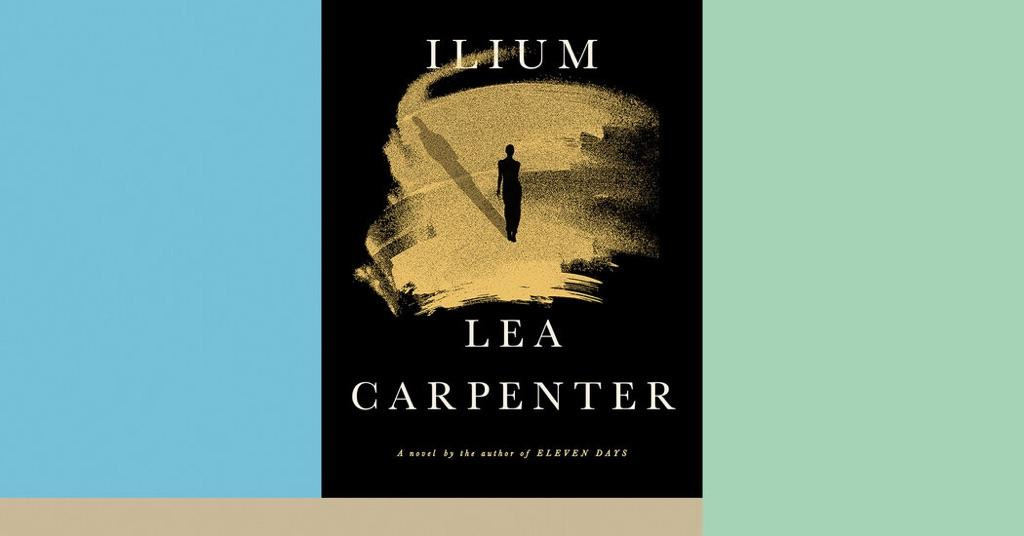
Ilium is “set in the dark world of international espionage, from London to Mallorca, Croatia, Paris, and Cap Ferret” and is “the gripping and suspenseful story of a young woman who unwittingly becomes a perfect asset in the long overdue finale of a covert special op.”
“Lea Carpenter clearly knows the world of espionage well….While Carpenter knows how to dish out the dread that a spy story needs, what makes “Ilium” intriguing are the characters….This is the sort of moral ambiguity that seems to fascinate Carpenter, the way living a double life and every day making your cover, that critical and deeply embedded lie, feels real to everyone around you. It’s also what makes “Ilium” such an unexpectedly moving novel.” —The New York Times
“A lonely young woman yearning for travel, risk and excitement is swept off her feet by an older man who lives the life of her dreams…In this literary spy novel, Carpenter considers whether it is possible to be on different sides of a war yet still embrace a shared humanity.” —Washington Post
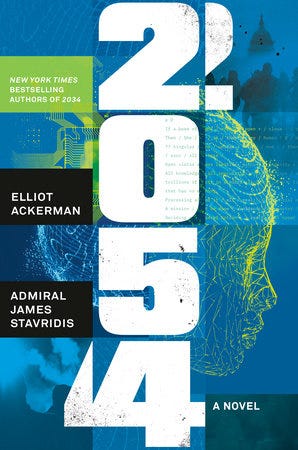
2054 arrives as Elliot Ackerman’s and Admiral James Savridis’ second in a trilogy which premiered in 2022 with the novel 2034. For the early reviews and description, I share these words of others:
“From the acclaimed authors of the runaway New York Times bestseller 2034 comes another explosive work of speculative fiction set twenty years further in the future, at a moment when a radical leap forward in artificial intelligence combines with America’s violent partisan divide to create an existential threat to the country, and the world…..As some of the world’s great powers, old and new, state and nonstate alike, struggle to outmaneuver one another in this new Great Game of scientific discovery, the outcome becomes entangled with the fate of American democracy….”
A starred Publishers Weekly review notes: “Former Marine Ackerman and retired Navy admiral Stavridis follow up 2034 with another top-shelf thriller about near-future geopolitical turmoil….Spreading the narrative’s focus over many characters and nations, Ackerman and Stavridis paint a sweeping and resonant portrait of a world faced with a powerful technological advancement it doesn’t fully understand. The results are genuinely chilling.”
[Both novels can be ordered at the link on the book titles above or at any bookstore or online bookstore.]
In previous scenes from Burning Distance I’ve focused on London where much of the novel takes place but shift here to Washington, DC where the story also is set. Below are a few pictures and passages from Burning Distance, which appears in paperback this month on February 20 from Oceanview Publishing.
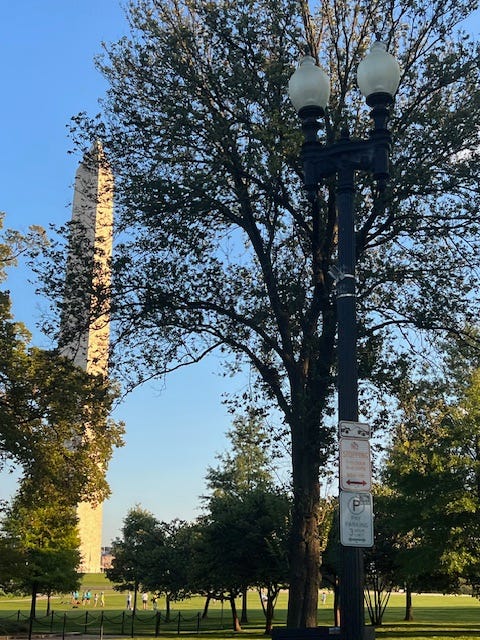
(Over the years I’ve accumulated a running list of words I haven’t known from two main sources: WordDaily and WordGenius)
Acedia
/uh see dee uh/
Part of speech: noun
1.Spiritual or mental sloth; apathy.
Examples:
"Many medical students report feeling a sense of acedia during the long hours of their residencies."
"The meditation retreat relieved the mood of acedia I’d been feeling for the past year."
"I was overwhelmed with acedia when I tried to take two extra courses last semester."
Monosemy
/mono se mi/
Part of speech: noun
1.The property of having only one meaning.
Examples:
"I'll be presenting a paper on the difficulties of translating monosemy and polysemy in ancient texts at the conference."
“We’re taking a monosemy approach for the first round of research.”
“The artificial language is built on a monosemy structure.”
Ontic
/on tik/
Part of speech: adjective
1.Possessing the character of real rather than phenomenal existence; noumenal
Examples:
"We can see the ontic results of the new technology playing out in schools right now."
"Let's not talk about theories; we have ontic data."
“After years of hypotheses, we can now review the ontic conclusions.”
I’ve spoken at bookstores, university classes, book luncheons and in-person and zoom book clubs and look forward to more ahead. I enjoy giving readings and addressing audiences in many venues and moderating discussions on a wide range of topics.
Click here for a list of future and past public events.
Or fill out the speaking request form to schedule an event.
I like engaging with readers so if you are in a Reading Group or Book Club and read one of my books, I’m glad to be in touch by email, zoom, or when possible in person. I can also suggest discussion topics.
Fill out the reading group form here to schedule a meeting.







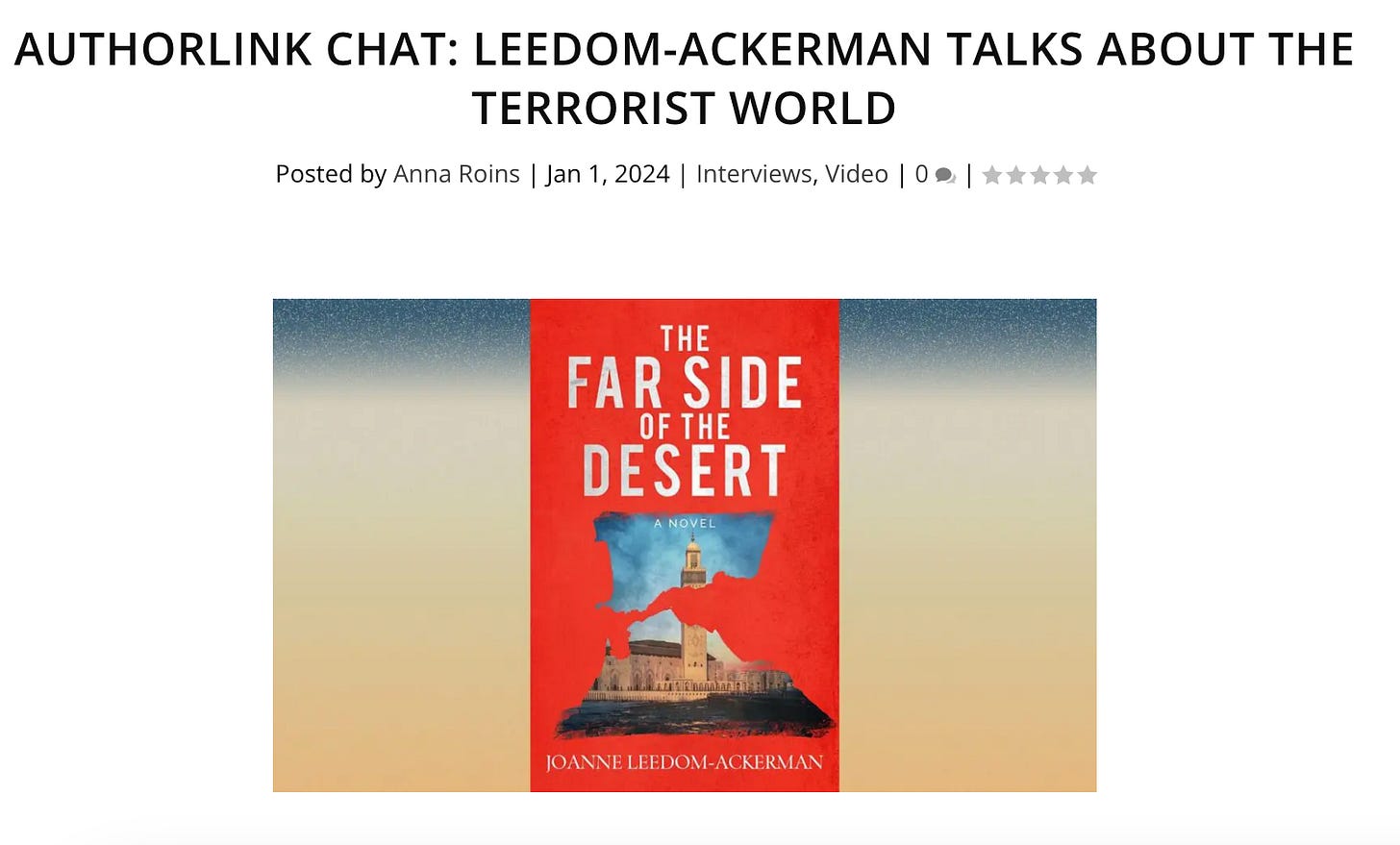
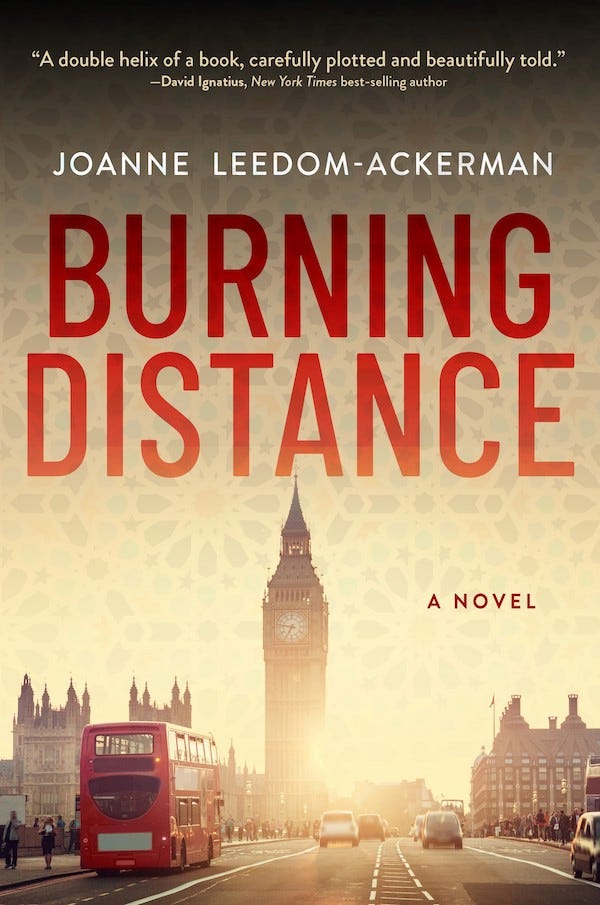


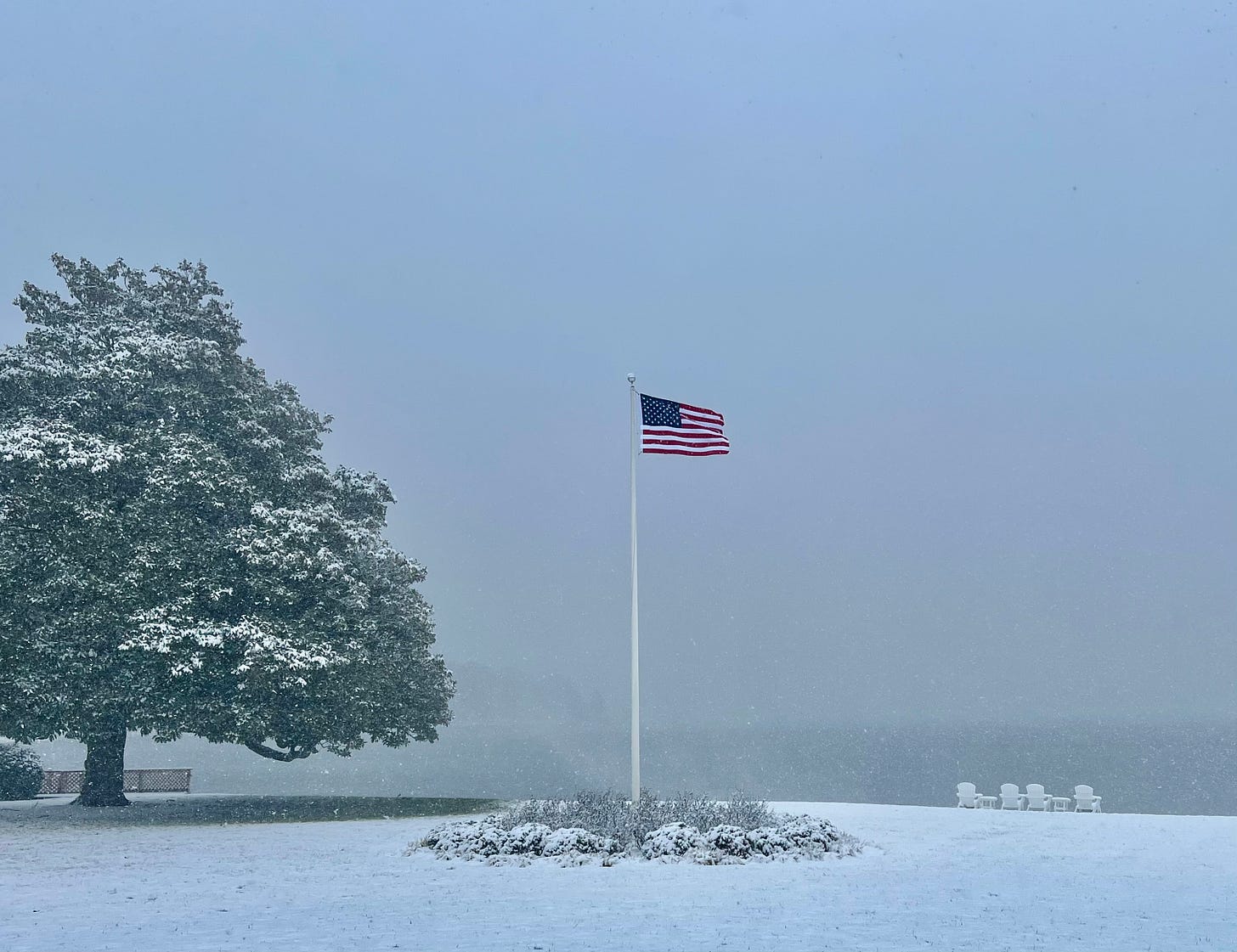






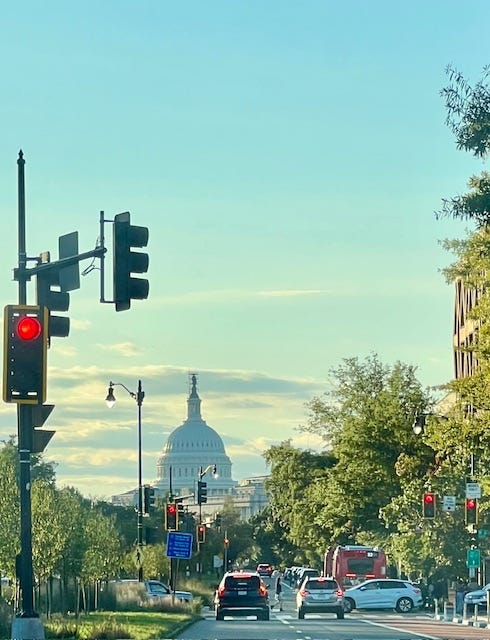


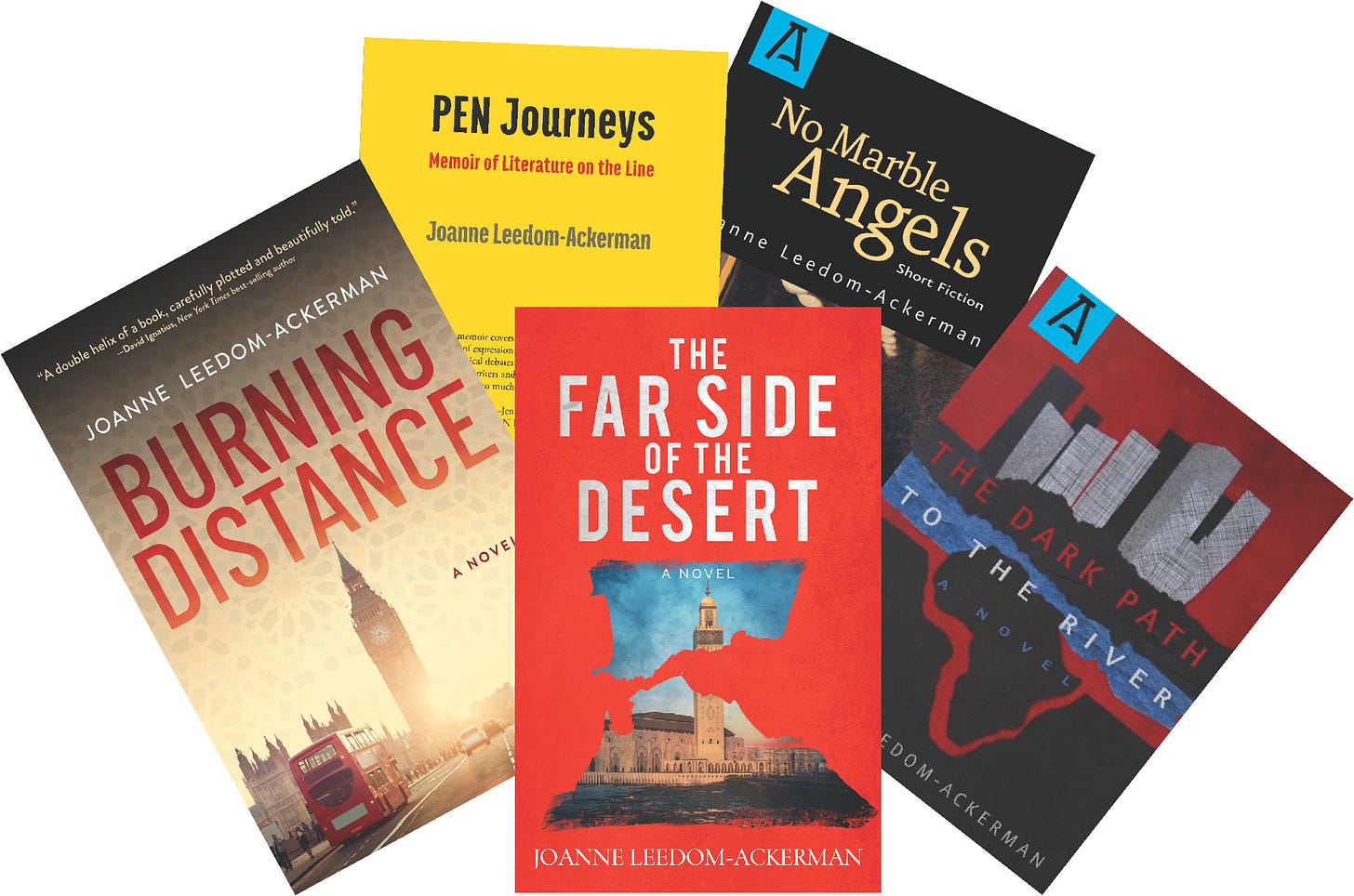
Inspiring thoughts Joanne. Thanks.
Your photo with the flag is uplifting, complementing your words.
Malcolm
The oysters are individually and collectively doing such a heroic job! Yet we humans seem to be moving ever further away from cleaning up the contaminating discord that plagues this nation and other countries around the world. That is such a discouraging thought about our society and yet all of us know individuals such as our blogger who are heroically making things better every day.